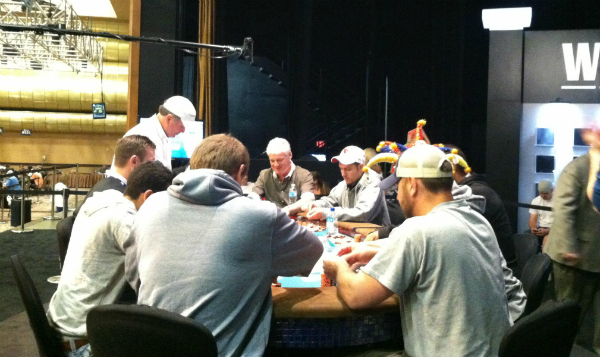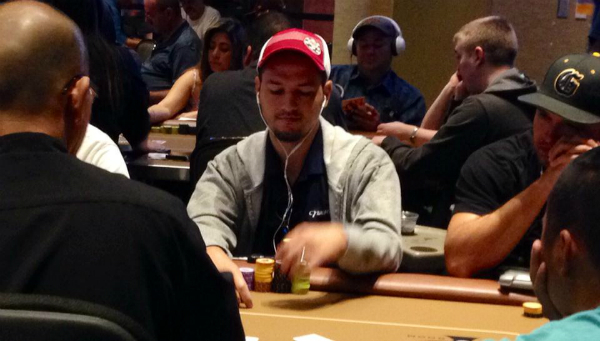Before I became a startup enthusiast, I played poker. I actually played poker “professionally” for about a year. That year was filled with a lot of lessons that I’d be able to take with me. I didn’t realize so many of the lessons would relate to business at the time, but I can look back now and definitely say it helped shape my approach to startups.
Taking Risks
If you aren’t a risk taker yourself, you are going to find it pretty difficult to find success in poker or in the business world.
Every hand has some sort of inherited risk factor. Even the best hand going in (two aces) is only slightly more than 80% to win a given hand before any cards are shown.
Taking the leap to starting a business is a massive risk. Your family and friends are affected due to the time commitment it will take. Nevermind if the business doesn’t work out – and statistically it probably won’t.
The Ups and Downs
The swings in poker and in business can be incredible.
One day when playing poker I won $23,000 in one day. I then lost $22,000 the next day.
In the same month with my digital marketing agency we signed two clients totaling $8,500 per month in revenue the same month we lost a contract that paid us $10,000 per month.
You have to determine what your risk tolerance is. I’ve come to realize my risk tolerance is a little higher than most. That may, or may not, be a good thing. I guess we wil find out!
Celebrate the Small Wins
With poker, I’m pretty aggressive.
I will always raise big hands versus letting others catch up. My motto is, I would rather win a small pot than lose a big one.
Every hand I win (even if it is just the blinds), is a good thing.
Every new customer or client should be celebrated. When my digital marketing agency gets a customer we let out a “ring the bell!”
It’s momentum!
Study the Losses
If I lose a hand I rarely just call a player a “donkey” and instead try to evaluate what I could have done different (if anything).
I’ll review the hand and look for betting patterns, tells, etc. Review what went wrong, who did what, how can it be prevented, etc.
If you lose a customer (or even just have a disgruntled customer), take that as an opportunity to improve your business. There’s a lesson to be learned there and it’s up to you to learn from it. Maybe having a better operating procedure could have prevented it?
Bluffing
You won’t be a profitable poker player if you don’t bluff. The key is knowing when to bluff. So many new players do it too often and it’s easy to spot.
When you know how to bluff, you are unpredictable and that’s the position you want to be in.
Fake it ’til you make it.
You want to shake hands and talk with people who are much more successful than you. Or maybe you want to land a big client that needs a team or a business with lots of resources. There are times you just have to represent you’re a little bigger or a little more successful than you are.
Sometimes, early on especially, you have to scratch and claw your way. Say ‘yes’ and figure it out later.
Reputation
When you are sitting at a poker table with other players, you develop a table image.
If you are playing lots of hands, you will be viewed as “loose” and you will find more players willing to play with you. If you only play big hands, you will be viewed as “tight” and won’t find the same number of players playing against you.
In business, you are being evaluated at every interaction.
Are you delivering a quality customer service experience. Are you dressed appropriately at the networking function? Did the customer get the results they expected from working with you?
It is pretty amazing how small the business community is in each city. I’m in Phoenix, a top 5 city nationwide in population, but everyone knows everyone in the business community. So don’t talk bad about others!
Early Work Can Pay Off Later
I’ve played in a handful of World Series of Poker events and two Arizona State Poker Championship events. A couple years ago I made a final table at a World Series of Poker event. 
Just a couple weeks ago I finished 20th at the Arizona State Poker Championship out of 1,460 players. I also cashed in my other Arizona State Poker Championship.

I would not have been able to have that success without the time investment years before in learning the craft.
You don’t always see the benefits right away. It may take months or, in my case, years before it pays off.
The same can be said in a startup. The things you learn at the beginning (whether you make the right or wrong decision) is something that you will be able to draw from later.
The lessons can be in learning what tools to use to do the job, what hiring qualifications you look for, your sales messaging, etc.
Be Aggressive
Poker favors the aggressive players.
Have a big hand? Raise! First into the pot? Raise! Small blind limp in on your big blind? Raise! Now I understand these are very general, but the idea is you should be raising as much, if not more, than calling.
This forces tough decisions to be made by your opponents.
Businesses, just like people, are typically passive in nature. This is an advantage to you if you know how to leverage it. You could be more aggressively pursuing a particular client, setting up your network or key third party partnerships, recruiting the best talent, etc.
Know the Numbers
Always know your outs.
When you are trying to get a “made” hand, you need to know all the ways in which you can get there.
There are some basic rules of thumb to poker mathematics. If you need one more card for a flush after the flop, you have 9 outs. There are 13 cards of each suit and you have four of them.
After the flop, you multiply your outs by 4 and after the turn you multiply your outs by 2 to give you an approximate percentage of hitting a hand.
In this case you are 36% to hit your flush after the flop and 18% after the turn.
Once you have your outs, you have to know your pot odds to determine if calling, raising or folding makes sense.
If you have a flush draw and you have to call $50 into a $100 pot, then you should fold as you are only getting 2 to 1 on your money. If you have to call $50 into a $150 or bigger pot than a call or even a raise is justified.
With a business, you need to know your key metrics.
What is your average lifetime value (LTV) of your customer? This is key, because you then know how much you can spend on advertsing and marketing in order to acquire each customer. That means, you then need to know your customer acquisition costs.
If a customer has a LTV of $150, but it is costing you $175 to acquire a customer – then you are going nowhere fast.
Make Decisions
Every poker hand you are faced with decisions.
Should you fold? Call? Raise? The decisions get harder based on the level of your hand.
The good news is, you HAVE to make the decision.
In business, that isn’t the case. Sometimes you’ll put off key decisions because you don’t have someone staring you down waiting for your answer.
Making decisions is one of the key ingredients to being successful. I came up with a quote about a year ago:
Even if it is the “wrong” decision, at least you can learn from it and move on.
With poker, and in business, I have learned to trust my gut more and more and will make immediate decisions based on that feeling. The nice thing with business is I can always re-evaluate that decision later.
Conclusion
As you can see, there are quite a few traits from poker that I have learned to take with me in my business endeavors.
So far it has done me well.
One thing that I didn’t mention is to take the time to read. Sharpen your skills. My bookshelves and my Kindle are littered with both poker and business books.








 "Justin is the proto-type of a 21st century business leader. Unmatched skills with evolving technology, combined with the social and emotional intelligence required to handle an increasingly advanced consumer." ~ Michael Lambourne of Blend.
"Justin is the proto-type of a 21st century business leader. Unmatched skills with evolving technology, combined with the social and emotional intelligence required to handle an increasingly advanced consumer." ~ Michael Lambourne of Blend.
Awesome post. Really interesting insider’s look into the mind of a poker/startup genius.
Hah – I don’t know if I would go that far, but thank you for reading. 🙂
Nice and useful post. Thank you! I also like to play poker and the points you stated are really worth taking into consideration.
Thanks Tigran, glad you enjoyed. 🙂
As always Justin, great insights . I do not play cards, yet love the academics of risks, image and chance. Mostly from a etiology perspective.
Although one of my models as a builder, built the Stratosphere in the “Now” coolest Arts-Tech District, Las Vegas. No one gave the gambler any respect when he presented the Blue strato prints . So risk like chance follow chance favors a prepared mind, chance risk which seems ti rush along with slack, reins bridled *is governed by laws, motion is natural & violent. The law that much of your insights, Or, mine or anyone including customers can be traced in a law governing; “Quintessence.” This law rules out catena *chains of conforminity, increasing ones vision, purpose, chance, risk ; while increasing motion to feed all natural laws: seen, proofed and those still awaiting risk takers in proofing these unseen, natural laws governing.
Countless poker players, prepared, countless poets prepared: therefore chance favored Bob,his Strata when floor by floor, one gamble,risk at a time, bridled enough of the violent motion opening chances in natural. The best part, today so many years later, ask any old timer at the SPhere working if they miss Bob..wow, in their eyes as reply of people in etiocauses reflecting opens hearts. The Gambler, the Employer, The Dreamer rightly prepared, leave untold riches in countless, generations as we evolve the greater unseen nature’s in risk, chance and arts. The current art-teck trends around the Stratasphere…proof One risk created a breeze of chance, and a whole transition won!
T, Sq. Jim.
I agree that poker can teach us a lot about business. That’s one of the reasons that I’m going to buy a poker table for my house. I would love to continue playing for fun at my home. I like how you mention the correlation with taking risks. Poker has taught me how to take calculated risks.
You make a great point about understanding your risk tolerance in poker and in business. Celebrating the small wins can also be needed, just as you shared.
Spot on Justin. I agree with you and I personally believe that along with poker, chess is also similar to business. They both require strategic planning and execution.
Wanderlust Poet recently posted…New Freelance Client (Poker Site) & Travelling Vietnam
This is a very apt comparison! With higher risk comes higher reward in many cases, and if you’re not willing to put yourself out there in either case, you might lose, but you’ll never win. Thanks for sharing!
Thanks Heather!